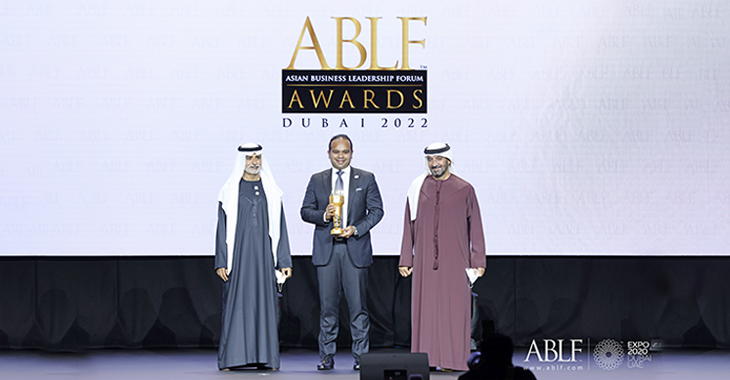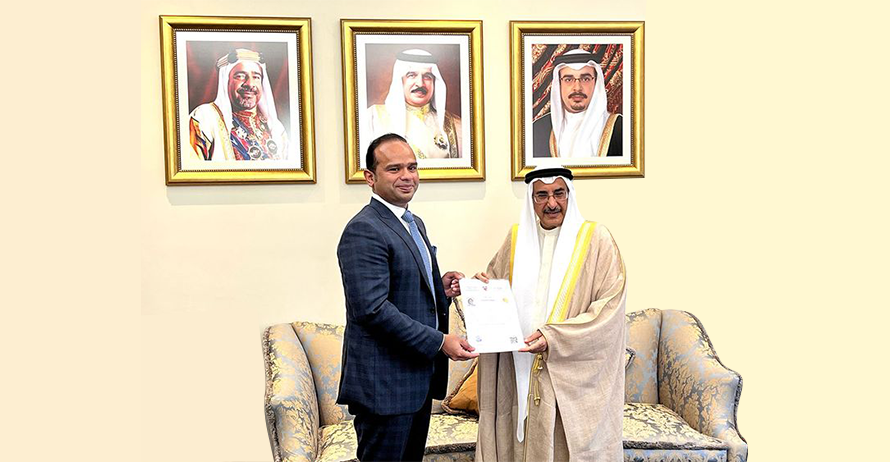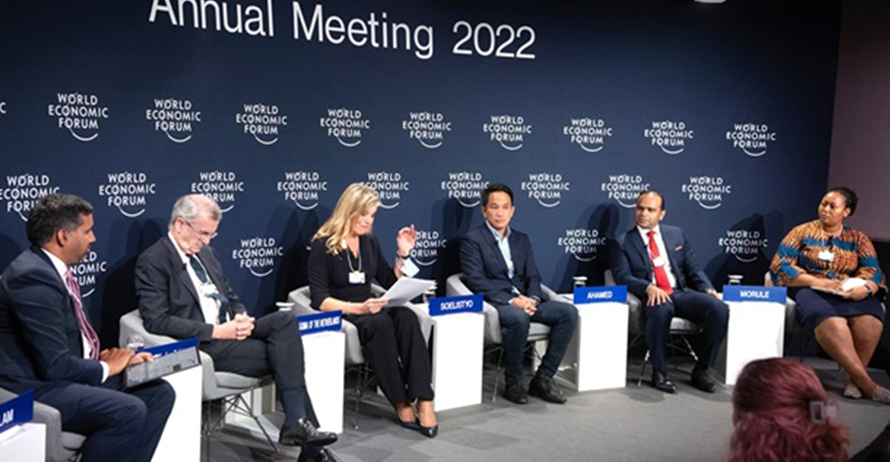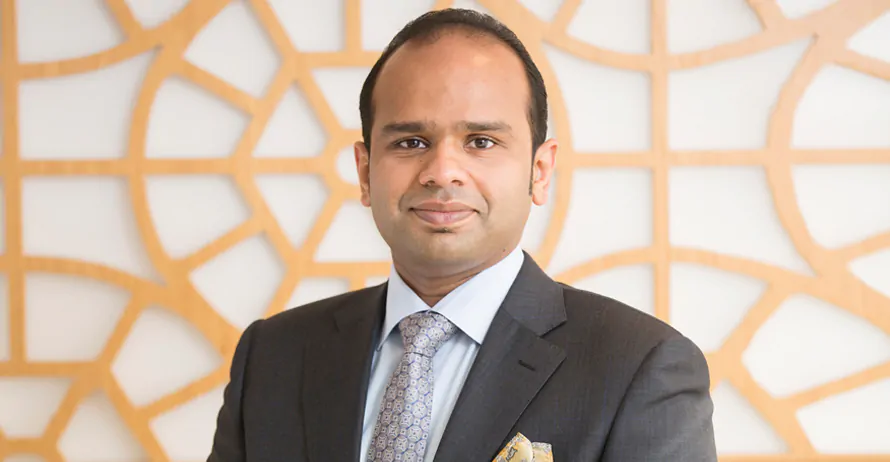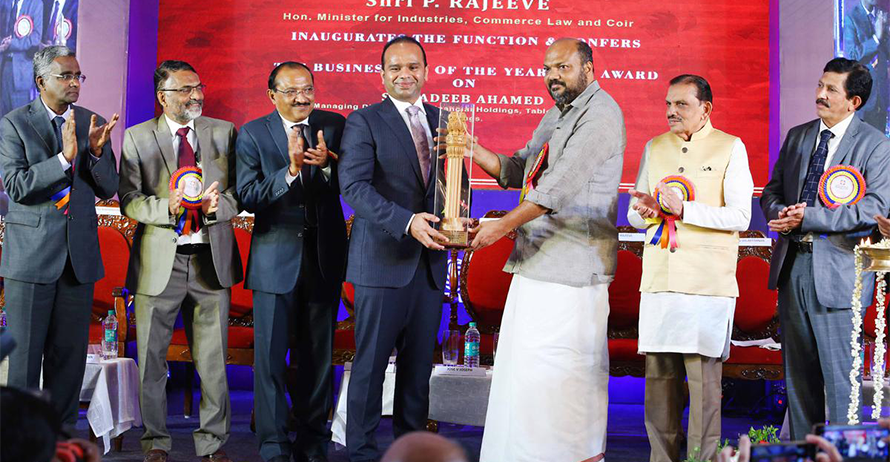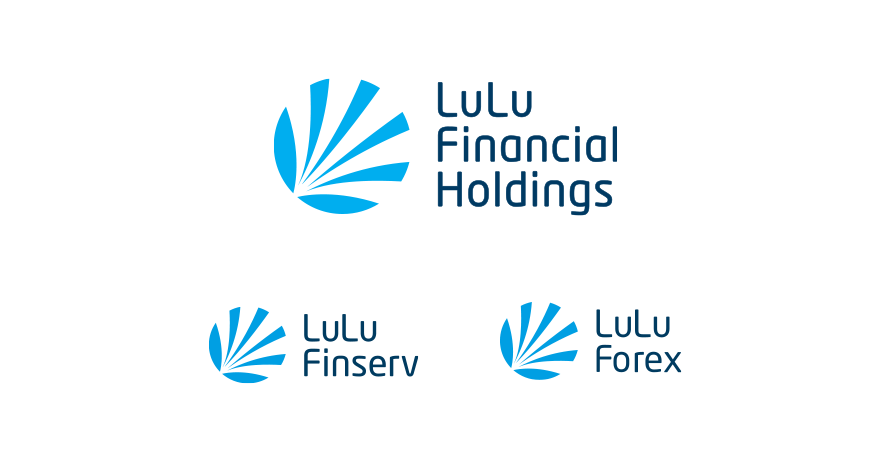The prestigious Asian Business Leadership Forum (ABLF) Awards 2022, held under the patronage of Sheikh Nahyan Mubarak Al Nahyan, UAE Minister of Tolerance and Coexistence, and in partnership with the UAE Ministry of Economy and Dubai Cares, was held on Tuesday at a glittering ceremony at the Dubai Expo.
Sheikh Ahmed bin Saeed Al Maktoum, President, Dubai Civil Aviation Authority; Chairman and Chief Executive of Emirates Airline and Group; and Chairman of the Expo 2020 Dubai Higher Committee, graced the occasion as chief guest to felicitate 20 iconic industry stalwarts for their role in sustainable progress.
The ABLF Awards recognises the courage, spirit and fortitude of Asian leaders who are redefining the parameters of ‘sustainable progress’ in the pandemic-ravaged world, and this year’s theme was – ‘Resilience Rising: The Great Reset’.
Some of the award winners this year include Mahinda Rajapaksa, Prime Minister, Sri Lanka (ABLF Statesperson Award); Ban Ki-Moon, former UN Secretary-General (ABLF Social Humanitarian Award); Zayed R. Alzayani, Minister of Industry, Commerce and Tourism, Bahrain (ABLF Ambassador of Commerce Award); Mariam bint Mohammed Almheiri, Minister of Climate Change and Environment, UAE (ABLF Trailblazer Award); M.K. Stalin, chief minister, Tamil Nadu, India (ABLF Statesperson Award); Adeeb Ahamed, managing director, LuLu Financial Holdings (ABLF Outstanding Business Achiever Award); Nuseir Yassin, CEO and founder, Nas Daily and Nas Academy (ABLF Social Influencer Award); and Aroon Purie, founding chairman and editor-in-chief, India Today Group (ABLF Lifetime Achievement Award).
This year’s event also witnessed the launch of a unique initiative by the ABLF and Dubai Cares for the auction of an exclusive diamond-studded ABLF Trophy. All proceeds of the auction will be donated towards Dubai Cares’ initiatives for the education of underserved children around the world.
The awards ceremony was preceded by the ABLF Talks Roundtable Showcase – an exclusive gathering of minds to discuss on crucial socio-economic issues. The conversations held during the 45-minute session rallied around the strategies adopted by leaders to help their organizations and communities recover from the impact of the pandemic.
Main Category: News
LuLu Financial Group Head, Adeeb Ahamed receives Bahraini Golden Visa
Adeeb Ahamed, Managing Director of Lulu Financial Group, has received the Bahrain golden residency visa. Ahamed was awarded the honour by Shaikh Khalid bin Abdulla Al Khalifa, Deputy Prime Minister of Bahrain. “I am humbled and delighted to receive this honor today. I thank His Majesty King Hamad bin Eisa Al Khalifa, His Royal Highness Salman bin Hamad Al Khalifa, Crown Prince and Prime Minister of Bahrain and the government and people of Bahrain, for bestowing this recognition on me,” Ahamed said, after receiving his Golden Visa.
Launched in February this year, the Golden residency visa for non-Bahrainis is part of the country’s economic recovery plan to attract global talent and boost investment to Bahrain. “The Golden Visa is a benchmark of recognition that will boost Bahrain’s image as a business hub, in traditional and new-age sectors,” Ahamed added.
Business of remittances should not be limited to ensuring funds reach recipients
When the pandemic struck, experts forecast a massive dip in global remittances. These forecasts though didn’t consider the power of human emotion in connecting the world’s 200+ million migrant communities with their families back home.
Negating all forecasts, the remittance industry saw a drop of only 1.6 per cent in 2020 and went beyond expectations to record a growth in 2021. A familial bond holds an intangible value, as the numbers prove. This year, the International Day of Family Remittances – celebrated annually on June 16 – comes at a time when the world is grappling with a heightened sense of economic insecurity.
While economies will struggle and jobs affected, the migrant worker’s role in strengthening the social contract with their loved ones has gained newfound attention. The sacrifice and hardship of the world’s migrants are a precursor to the $600 billion and more remitted every year. Over 800 million families rely on this flow to supplement their income shortages and lead a qualitative life. The role of remittances in upholding the UN’s Sustainable Development Goals cannot be discounted, although it only forms half the story of family wellbeing.
Enabling financial inclusion for families
Equitable financial inclusion remains the ultimate KPI of a society in progress. In developing economies, families at the receiving end of remitted money often have little understanding of avenues for savings and investments. Yes, the money is coming in, but it’s always risky to be dependent solely on it for sustenance.
In this regard, it’s important to empower families and create opportunities for easier access to finance, as well as to invest one’s human capital into income streams to grow their standard of life. Conjoining this other half of the spectrum with the remittance economy is thus critical to ensure a migrant’s contribution reaps good dividends at a family and community level.
Financial literacy takes top priority in this regard. The onus is on multiple stakeholders connected to the financial services ecosystem to bridge the gap so that this flow of money acts as capital or source of investment for families to take the next step in wealth creation. This will ultimately have a far-reaching impact on shaping several aspects of community development by promoting entrepreneurship and a yearning for sustainable livelihood in the society.
Programs around financial literacy aren’t new, but tying their objectives with beneficiary families is bound to have a greater scope in unlocking societal development. In an uncertain world, there cannot be a bigger contribution to advance the cause of financial inclusion, while simultaneously honoring the efforts of those remitting their hard-earned money.
LuLu Financial Holdings and Samsara Remit Select Aerotruth for B2B Partner Onboarding
Both Abu Dhabi-based LuLu Financial Holdings and the Nepal – based money transfer service Samsara Remit join Aerotruth‘s commercial partner onboarding platform. Aerotruth is an Australian and New Zealand-based startup. Its online platform has been designed to make the partner business-to-business (B2B) onboarding process for fintechs, banks and other financial institutions easier. The industry is currently experiencing a heightened level of inter-sector collaboration but also remains dependent on efficient B2B partner onboarding processes.
Traditional email-based onboarding methods are time-consuming, burdening companies with cumbersome documentation exchanges. Delays and technical complexities also lead to abandonment, further magnifying the costs of inefficient onboarding processes.
In an effort to reevaluate the maintenance of this process, both LuLu Financial Holdings and Samsara Remit are to now leverage Aerotruth’s cloud-based software-as-a-service (SaaS) document repository platform. Aerotruth’s platform assists in the management of the document exchange process required between companies when onboarding new and existing commercial partners. Aerotruth’s clients can also network with each other, providing a pre-qualified avenue to partnership and network growth.
Identifying a “real and pressing global need for a safe and secure software platform for partner onboarding” Aerotruth co-founder and CEO Michael Liu remains “delighted” with the news of LuLu Financial Holdings and Samsara Remit are using the company’s platform.
Expressing that the company’s fintech arm, Digit9, was actively seeking to digitise its partner onboarding process, LuLu Financial Holdings’ head of business transformation Joseph Cleetus describes how the company found a solution in Aerotruth, sharing “Aerotruth has made that process possible, and we look forward to being a part of the Aerotruth ecosystem.”
It’s the same story for Samsara Remit, with the company’s head of business development Suraj Chhetri describing how it “wanted to move away from the manual process of onboarding our global partners” while going on to complement how the platform is “very easy to use” and “gives our partners a digital-first solution and smooth user experience when we invite them to the Aerotruth platform to submit due diligence documents.”
Spotlight on financial inclusion at World Economic Forum
Financial inclusion remains the first step towards personal and business well-being and is a pre-requisite to meet several goals under the UN’s Sustainable Development Goals.
Despite this, over half the world is yet to gain equitable access to finance and this remains one of the biggest challenges facing the world today.
The World Economic Forum, which is driving forward the agenda of stakeholder capitalism, has consistently focused on financial inclusion and the role it plays in helping communities thrive.
This all-important topic was a subject of discussion on the second day of the ongoing WEF at Davos, with several global stakeholders convening to discuss this issue.
Queen Máxima of the Netherlands opened the session raising a question on the need for public and private stakeholders to fully understand the purpose of financial inclusion and evaluate how it can result in better financial health of an individual.
Karabo Morule of Capital Art, South Africa, brought up the subject of financial literacy as a key element of driving better use of access to finance. Her call for financial literacy finds relevance in various research studies which show a significant correlation between financial inclusion and financial education. In fact, developing countries today report a financial literacy level of as low as 30% compared to the average of 60% in developed economies.
Against this background, Morule spoke of how financial literacy would encourage people to invest in insurance, especially among the underprivileged and marginal groups.
Her thoughts on connecting the underprivileged with prudent products was echoed by Adeeb Ahamed, whose company, LuLu Financial Holdings, is involved in the cross-border remittances and micro-loans segment.
With over 1.1bn people worldwide locked out of formal financial channels due to lack of a verifiable identity, Adeeb Ahamed took the examples of India’s Aadhar scheme and UAE’s Wage Protection Scheme to drive home the need for better traceability of consumer spending.
According to him, this is important to complement awareness about products suited to the needs of the under-served. Adeeb also suggested that while digitisation has its inherent benefits, financial institutions should remember the emotional aspect at the grassroots level and accordingly bring in a personalised touch to their services to ensure last-mile consumers are onboarded efficiently.
Gelsomina Vigliotti of the European Investment Bank, which works with several developing economies on grassroots level projects, further mentioned that access to finance should come with adequate skill training and development so that the money is utilised properly.
Merely gaining financial access doesn’t guarantee growth but having a strong business case to deploy it makes the difference, she added.
Andre Soelistyo of GoTo Indonesia asked for greater public-private involvement to drive down the cost of moving money to zero. According to him, this is necessary to build sustainable solutions that can get people to utilise financial products suited to their well-being. He spoke of how his company was able to leverage the potential of digital solutions during the pandemic to onboard millions of motorbike riders in Indonesia, thereby giving them access to the market opportunity.
Central to this point of digitisation, the conversation also touched upon various aspects of cyber fraud, especially with digital newbies having little awareness of the security involved. Globally, cybercrime is up by 600% as more people move online, with 67% of financial institutions reporting an increase in cyber-attacks over the past year.
Against this backdrop, François Villeroy de Galhau, Governor of the Bank of France, admitted that while this is a concern, there should not be a trade-off between digitisation and regulation in the march towards greater financial inclusion. He expected stakeholders to work together so that both grow in tandem with the demand.
He was also vocal about the need to bring in gamification elements into financial literacy campaigns, suggesting strongly that financial literacy cannot be done in isolation.
The conversation, which was moderated by Faisal Islam, Economics Editor, BBC, also touched upon several successful case studies from developing economies such as the UAE, India, Bangladesh, Indonesia and South Africa among others.
Financial inclusion can never be complete without taking in the ‘unidentified’
While at the World Economic Forum this week, I’ve been part of conversations calling for greater government intervention in achieving financial inclusion. Two years into this decade of rampant digitization, I have to admit that governments have actually been quite proactive in easing regulations and enabling a favorable environment for businesses to thrive.
The inevitable question arises: What more can private stakeholders do then to ensure equitable access to finance? Financial inclusion is not merely onboarding the underserved to formal banking channels, but ensuring easier access to finance whenever one needs and having the necessary skills and knowledge to multiply it for further wellbeing. In this regard, let’s for a moment step back and consider the first and most challenging step for financial inclusion today: lack of verifiable identity.
According to the World Bank, more than 1.1 billion people globally live without an identity proof. In South Asia alone, 32 per cent of the population (approximately 350 million people) do not have an official identity. In sub-Saharan Africa, 46 per cent of the population (approximately 500 million people) do not have an official identity.
Without verifiable identities, financial institutions cannot onboard these populations. An individual’s verifiable identity thus becomes a critical factor to get them even remotely close to formal financial channels. There are developing nations that have successfully achieved this: the UAE’s Emirates ID and India’s Aadhar scheme are perfect examples.
Fintechs can help out
Until these regulated identities are more widespread, there is the availability of social data being used by fintechs and NBFCs which need to be explored further. This alternative data uses a risk-based KYC approach, or to put it simply a ‘Know Your Customer Better’ approach.
In this process, some basic information is collected from the customer, and they are given access to smaller funds at first. As their credit score improves, more information is collected, and the lending amount is gradually increased. This is the model of microfinance, which has been a life-saver in many developing economies.
Standardizing this alternate data across different jurisdictions is what is important in today’s age, to ensure uniformity of assessment and identification of the underserved. For ultimately, getting the underserved into formal banking channels requires that they have access to finance.
Banks can lend a hand
Which brings us to how legacy institutions can tap into this data to realize financial inclusion. This is where the private-private collaboration comes into play.
Larger banks have their own due diligence and processes to follow, but by partnering with regional fintechs and NBFCs in some economies, banks get to tap the grassroots without taking on the risk entirely.
Banks bring with them capital, infrastructure and expertise. Regional institutions bring with them a pulse of the people with their localized/on-ground expertise. For example, in India, it’s nearly impossible for the larger banks to reach the remotest corners of the country. The regional NBFCs, as well as some of the new-age fintechs and banking correspondents though, have a good reach among the grassroots.
Greater partnership between these private stakeholders of the financial services ecosystem will ultimately lead to faster penetration of quality services in a regulated manner. When the private sector converges thus, government intervention can be reserved to the core areas, without either having to do a trade-off on the pace of digital inclusion.
Financial inclusion today defines the state of an economy. Governments are active participants in improving regulations, conducting financial literacy programmes, upgrading infrastructure and what not. If the vision remains to make people’s lives better, then it is the private sector’s responsibility to band together and conjoin the pieces of the puzzle.
Banks should offer specific credit schemes for MSMEs in Kerala: Minister Rajeeve
Kerala Industries Minister P Rajeeve has urged the banks in the State to extend support by offering specific credit schemes for MSMEs, which will boost the measures adopted as part of development programmes.
Inaugurating the 13th State Forum of Bankers Clubs Kerala (SFBCK) Banking Excellence & Businessman of the Year award presentation function, the Minister said FY 22-23 be considered as the Year of Enterprise for Kerala, thereby aiming for 1 lakh enterprises to get kick-started.
The Minister also conferred the SFBCK Businessman of the Year Award for 2021 on Adeeb Ahamed, MD of Lulu Financial Holdings, Tablez and Twenty 14 Holdings. Rajeeve also released the souvenir “Fellow Banker 2021” by handing over its first copy to K P Padmakumar, former chairman of Federal Bank.
Speaking on the occasion, Adeeb Ahamed mentioned about the digitization in the foreign inward remittance front to India and the impact of UPI on the payment systems across the world. He termed crypto as a major player in the future, with the economies being friendly with their regulations on crypto currencies.
He added that $10 billion transaction has been remitted through Lulu Exchange which includes 4 per cent of the global volume remitted to India alone. Inward remittance to India amounted to $ 87 billion during last year, of which Kerala accounted highest share among Indian states at 20 per cent.
The Bank of Maharashtra was named the best bank based on its performance during the fiscal year 2020–21, followed by Indian Bank and State Bank of India, which came in second and third place, respectively, based on their performance during the fiscal year 2020–21. CSB Bank Ltd secured the first position, followed by Tamilnad Mercantile Bank Ltd and RBL Bank Ltd., having secured second and third positions, respectively, in the private sector bank category.
HDFC Bank Ltd took first place in the new generation (private) bank category, followed by ICICI Bank Ltd and Kotak Mahindra Bank Ltd who took second and third place, respectively. Canara Bank was given special recognition for their outstanding performance, mainly focusing on village development in Kerala.
Upbeat on growth prospects, Lulu Financial Holdings to expand NBFC business in India
Bullish on growth prospects, Abu-Dhabi headquartered Lulu Financial Holdings is expanding its NBFC business in India by initially focusing on organic growth and is targeting to have a loan book size of Rs 100 crore by the end of March next year, according to a top company official.
Lulu Financial Holdings, which is mainly into financial services, has investments in the Indian sub-continent, GCC (Gulf Cooperation Council) and APAC (Asia Pacific) regions. In India, the company owns the NBFC — Lulu Financial Services (India) Private Ltd — and Lulu Forex Private Ltd, India.
The NBFC (Non-Banking Financial Company) started operations last year and is in the process of expanding its business starting from the South, Lulu Financial Holdings Managing Director Adeeb Ahamed said.
“We have got into the NBFC space and it is very big in India…. It is a growth sector and we are targeting that as an area that we will be investing more… We have started expanding in Kerala and we will be taking it to other states as well,” he told PTI in a recent interview. Currently, the NBFC business is focusing on the SME (Small and Medium Enterprises) sector. “We are hoping to have a book size of Rs 100 crore by March 2023. It is the lending side,” Ahamed said
In a report released in March, rating agency Icra Ratings said the asset under management of NBFCs (retail) in India is expected to grow by 5-7 per cent in fiscal 2022 and by 8-10 per cent in fiscal 2023. According to Ahamed, initially, the company will look at organic growth for the NBFC vertical as it will provide an opportunity to be more grounded and hear out the consumers more closely.
“If it is inorganic, then it will be taking too much on the plate at this point of time. With such volatility in the market, we would rather like to grow organically. First two years of expansion will be fully organic,” he said.
About the regulatory framework in India, Ahamed said the country is a strong and growing market, and there have been a lot of changes.
“India is a very strong market but it is a growing market. One should not see it in comparison to other matured markets and start making strategies that have worked in other markets. We would always want to see India as a market of its own, which has its own character… a lot of things have changed in the last few decades,” he pointed out.
Emphasising that his group is not here for a valuation purpose but for the long-term, Ahamed said it had set up the forex division in 2012 and at that time, it did not have the interest to go to any other space.
“Today, a lot of regulations have been eased and it is more comfortable for international people like us to come. It encourages us to come and start deploying our own funds in the market,” he said. Lulu Financial Holdings has a presence in the hospitality space also but the core focus is the financial sector.
